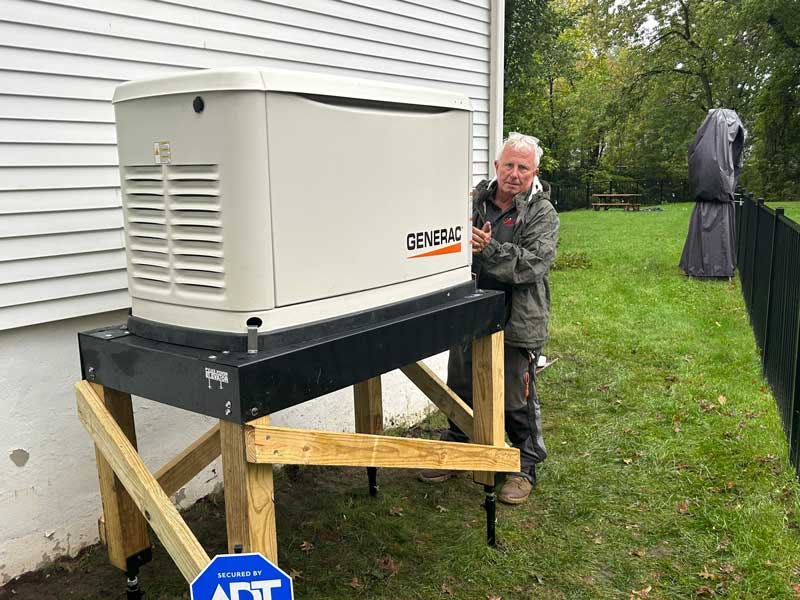June 30, 2025
Common Mistakes When Buying a Backup Generator
Power outages can strike at any time. Without electricity, your food spoils, your heating and cooling system shuts down, and your daily routine is disrupted. A home backup generator keeps everything running smoothly, but choosing the right size, fuel type, and placement is crucial. Avoid these eight common backup generator mistakes to help you make a wise investment.

Mistake #1: Misjudging Your Power Needs
Many people underestimate their power needs or buy the biggest generator they can find “just in case.” An undersized generator won’t keep essential appliances running, while an oversized one costs more and wastes fuel.
Calculating your home’s power needs is an important part of choosing the right generator. Start by listing the must-have appliances and devices you want to power during an outage. Check the wattage requirements on the product label and add them up to determine your ideal generator size. Keep in mind that some appliances, like refrigerators and HVAC systems, use extra power at startup. Consult a professional to ensure your calculations are correct.
Mistake #2: Overlooking Fuel Type and Availability
A generator may run on gasoline, diesel, propane, or natural gas. Each one has its pros and cons:
- Gasoline is easy to find but has a short shelf life.
- Diesel generators are fuel-efficient but often require large storage tanks.
- Propane is clean-burning and long-lasting, but you’ll need a propane supplier.
- Natural gas is convenient, but your home must have a gas line.
Choose your generator fuel source based on availability, storage space, and your long-term needs.
Mistake #3: Ignoring Noise Ratings
Some generators are loud enough to disturb your sleep, annoy the neighbors, or violate local noise regulations. While portable models tend to be noisier, standby generators still produce a constant hum. Before purchasing, check the generator’s decibel rating. High-end standby models are designed to run quietly.
Mistake #4: Skipping Professional Installation
A poorly installed generator can be dangerous and unreliable. Incorrect wiring, lack of ventilation, and improper fuel connections increase the risk of carbon monoxide poisoning, electrical hazards, and fires.
Hiring a licensed electrician ensures a safe, code-compliant installation. A professional will also properly connect the generator to your home’s electrical panel using a transfer switch, which prevents dangerous back feeding.
Mistake #5: Neglecting Regular Maintenance
Generators need routine upkeep to stay reliable. Skipping maintenance tasks could allow issues to develop without your knowledge, leaving you stranded when the next outage occurs.
At the very least, run your generator once a month to lubricate the engine. Also, check the oil, fuel levels, and air filters regularly. Many manufacturers recommend annual professional inspections, even if you haven’t used the generator, to keep it in peak condition.
Mistake #6: Failing to Get Proper Permits
Many areas have strict rules about generator installation, including noise restrictions, fuel storage limits, and placement guidelines. Skipping the permitting process can lead to fines or forced removal.
Before buying a generator, check with your local government and homeowner’s association to learn what’s required. Permits ensure the installation meets safety codes and won’t cause issues later. Before feeling overwhelmed, rest assured that a professional installer can help you navigate the permit approval process.
Mistake #7: Not Considering Generator Placement
Where you install your generator matters. It must be outside to ensure proper ventilation. Even so, placing it too close to windows, doors, or vents may let carbon monoxide seep into your home. Also, installing a standby generator on a slanted or uneven surface may cause operational or safety issues.
Always follow manufacturer guidelines for generator placement. Standby generators should be installed on a flat, level concrete pad at least five feet from building openings. The installation must also comply with local regulations and safety codes. If you’re unsure where to install your generator, a professional installer can help you find the best spot.
Mistake #8: Choosing Based Solely on Price
Going for the cheapest option might save money upfront, but it often means compromising on quality. An off-brand generator might experience problems like unreliable performance, frequent breakdowns, or higher fuel costs. It might also lack essential features like automatic startup or surge protection.
Rather than comparing purchase prices alone, consider long-term value. Expect a prolonged lifespan, fewer repairs, and consistent performance when you opt for a well-built generator from a reputable brand. Look for a model with strong warranty coverage and good customer reviews to ensure you get a dependable product.
Partner with Us for All Your Backup Power Needs
Seidel Electric Inc. has been serving the Tri-State Area since 1944. Our family-owned business in Blairstown, NJ, provides expert generator products and services, which include free in-home consultations and reliable Generac generator installation. Our knowledgeable and experienced electricians are ready to outfit your house with a dependable backup power source! Contact us today for more home backup generator tips or to request an installation estimate.
